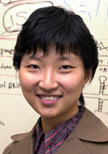
biophysicist Zhuang Xiaowei
CAS President Lu Yongxiang recently sent his congratulations to biophysicist Zhuang Xiaowei, 2003 winner of MacArthur Fellowship.
The Chicago-based MacArthur Foundation announced the 24 new recipients of its fellowship program on Oct. 5. Each will receive $500,000 in no strings attached support over the next five years.
Zhuang, 31, now an assistant professor of chemistry and chemical biology at Harvard University, won the award, dubbed as "genius grants," for her work tracking the behavior of individual molecules. She received her B.S. in 1991 from the University of Science and Technology of China (USTC) at the age of 19.
The award demonstrate Zhuang's excellent achievements and outstanding talent, says Prof. Lu, and it also shows that USTC is capable to bring out qualified professionals for the contingent of world-class scientists. He invites Dr. Zhuang to come back to China give lectures and do cooperative research with CAS colleagues.
Originally trained in polymer physics, Zhuang made several widely cited contributions to understanding the basic principles of liquid crystal behavior, findings that have direct application to the design of computer displays. She changed her research focus after graduate school to the study of protein folding and enzyme catalysis. Scientists typically study these processes by measuring bulk samples; Zhuang has demonstrated the use of fluorescent labeling techniques to monitor them within single molecules. Her studies verify that a given molecule can take more than one path during folding or catalysis sometimes measurements from bulk samples mask the less commonly used alternative paths. She also observed that, in reversible processes, individual molecules seem to "remember" their preferred path. Recently, Zhuang has applied single molecule methodology to explore the mechanism of viral membrane fusion with host cells. Understanding this process and its variations at the individual molecule level will provide critical insights into the basic biology of infection and may help to identify possible targets for therapeutic intervention in diseases such as AIDS and hepatitis.







